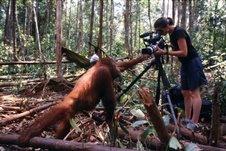Palm Oil threatens 1600 Orangutans
Minister warns company for posing threat to 1,600 orangutans
Palangka Raya, Central Kalimantan (ANTARA News) - Forestry Minister MS Kaban has strongly warned the Makin Business Group for planning to open an oil palm plantation in an area which hosts the habitat for about 1,600 orangutans in Katingan district, Central Kalimantan.
"We have given the company a warning and asked it to save the life of orangutans in the area," Minister Kaban said here Tuesday night.
Kaban made the remarks during a meeting between Vice President Jusuf Kalla and Central Kalimantan`s regional government officials, mining, plantation and forestry businesses.
The minister said if not seriously reprimanded Makin Group`s plan could lead to the [loss] of thousands of orangutans in the area.
Therefore, he called on the business group to save first the rare animals in the area which was to be turned into a plantation.
"I think Indonesia has been under a heavy spotlight for incompetence in preserving its biodiversity," the minister said.
Makin Group is planning to open a 50 thousand hectare oil palm plantation in Katingan district, Central Kalimantan, in 2007.
In the area, there is a habitat for orangutans with a population of 1,600.
In the meantime, Assistant Manager of the Borneo Orangutan Survival (BOS), Hardi Baktiantoro, said the opening of the plantation in Katingan district was a serious threat to 1,600 orangutans in Kalimantan.
"Based on our data, the area, where Makin Group is to open an oil palm plantation, is host to some 1,500-1,600 orangutans. If the company resumes its planning, it will exterminate the rare animals," he [said].
He predicted the population of the Kalimantan orangutan would have been extinct by 2010 in line with the opening up of forests to make way for palm oil plantations.
"The biggest threat to orangutans is the expansion of oil palm plantations," he said. (*)
Palangka Raya, Central Kalimantan (ANTARA News) - Forestry Minister MS Kaban has strongly warned the Makin Business Group for planning to open an oil palm plantation in an area which hosts the habitat for about 1,600 orangutans in Katingan district, Central Kalimantan.
"We have given the company a warning and asked it to save the life of orangutans in the area," Minister Kaban said here Tuesday night.
Kaban made the remarks during a meeting between Vice President Jusuf Kalla and Central Kalimantan`s regional government officials, mining, plantation and forestry businesses.
The minister said if not seriously reprimanded Makin Group`s plan could lead to the [loss] of thousands of orangutans in the area.
Therefore, he called on the business group to save first the rare animals in the area which was to be turned into a plantation.
"I think Indonesia has been under a heavy spotlight for incompetence in preserving its biodiversity," the minister said.
Makin Group is planning to open a 50 thousand hectare oil palm plantation in Katingan district, Central Kalimantan, in 2007.
In the area, there is a habitat for orangutans with a population of 1,600.
In the meantime, Assistant Manager of the Borneo Orangutan Survival (BOS), Hardi Baktiantoro, said the opening of the plantation in Katingan district was a serious threat to 1,600 orangutans in Kalimantan.
"Based on our data, the area, where Makin Group is to open an oil palm plantation, is host to some 1,500-1,600 orangutans. If the company resumes its planning, it will exterminate the rare animals," he [said].
He predicted the population of the Kalimantan orangutan would have been extinct by 2010 in line with the opening up of forests to make way for palm oil plantations.
"The biggest threat to orangutans is the expansion of oil palm plantations," he said. (*)
Copyright © 2006 ANTARA






5 comments:
I find it interesting that palm oil is bashed in such a manner. I just read on www.palmoiltruthfoundation.com that there is no such thing going on. Perhaps most people are not aware that a Palm Oil Wildlife Conservation Fund was recently launched? I even read somewhere the fund seeks to buy back orang utans from foreign zoos to relocate them to their natural habitat! Maybe it's time to rethink the villians in this scenario.
Cheers,
Sheila
Hi Sheila,
Sorry this post didn't go up immediately, we're not censoring opinions here, just stopping spam marketing messages.
Thank you for drawing our attention to this very interesting site.
I will be responding to some of the claims of this website in due course, when I have time to address the numerous points that I would like them to clarify. I am also waiting for my registration to the site to be cleared. In the meantime I would invite all visitors to the Orangutan Film Protection Project blog to have a look at "The Palm Oil Truth Foundation" site, and see what they make about the claims.
One thing I would like to make very clear now. We at the OFPP have never made claims about Malaysia, having not worked there, and we have always supported the goals of the Roundtable on Sustainable Palm Oil and support any initiative to provide truly sustainable palm oil.
We have no connection to CSPI, and would certainly not consider ourselves as lembu (see: http://www.palmoiltruthfoundation.com/index.php?option=com_content&task=view&id=224&Itemid=66)
)
We have been working in the plantations over the last two years and have not been following any herds. It's actually pretty tough work and it would be nice if there were more of us.
P.S. buying back orangutans is probably the worst way to spend conservation money. Much better to pay for natural forest protection i.e. orangutan habitat protection. There are still around 50,000 orangutans on Borneo and 7,300 in Sumatra, both populations currently suffering a 10% or greater annual decline. Lets protect these animals before spending money on training captive orangutans how to survive and thrive in the forest.
Nick,
Thanks for putting in my comments, I was wondering if they went missing. It is certainly good to know that you have connection to CSPI as I personally do not agree with their scare tactics.
To your other point, I understand that a small percentage goes to buying back the orangutans. The majority actually goes toward habitat protection.
I've visited the site recently but have not come across any comments from you though. Would you be addressing it through comments there or a write up on this blog?
I do hope that there will be more like you who genuinely love the environment and wildlife and take the time to monitor the situation whilst contributing anyway they can. Thank you for your hard work.
Dear Nick,
It's sure refreshing to read your measured and mature responses to Sheila's comments.
I agree with Sheila, having gone through some of the articles in the Palm Oil Truth site, that palm oil is a victim of some cocerted action by vested interests to slow down their advance in the world edible oil and biofuel market.
I personally agree that Cockroach has been kosher here. However, if palm oil is grown sustainably and yet comes under such vicious attacks leads to the irresistible conclusion that the other NGO's are doing the dirty work of protectionism under the guise of environmental concerns.
Post a Comment